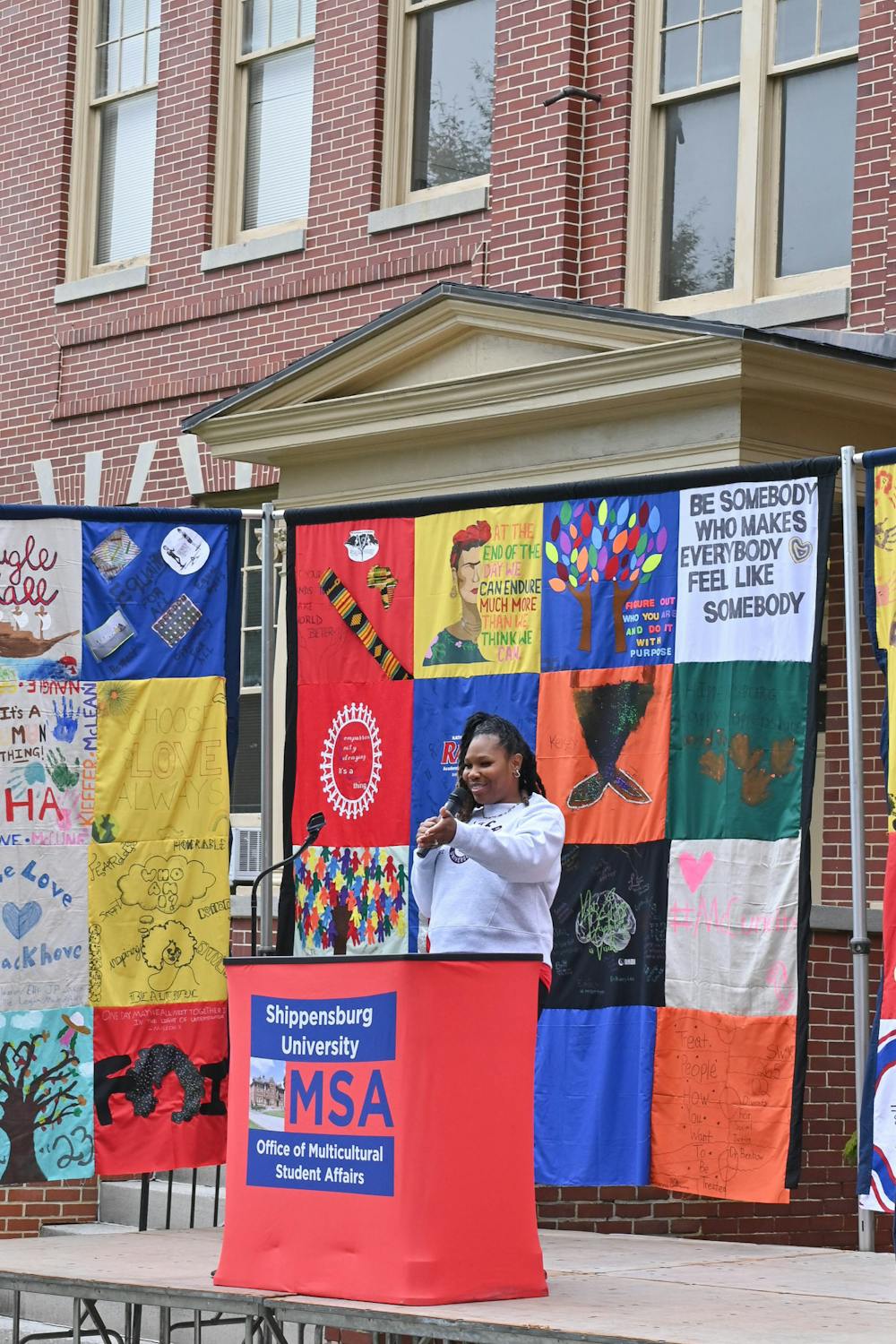The largest unveiling to date of the Quilt to Cover Us All, an annual project organized by the Office of Multicultural Student Affairs (MSA) at Shippensburg University, was last Friday on the Gilbert Hall lawn.
The quilt’s unveiling was the finale of Diversity Week 2023, which saw an uptick of nearly 400 student participants. There were “1,163 unique students in attendance this fall compared to 779 last year” at the numerous events, according to Manny Ruiz, SU Assistant Vice President for Inclusion and Belonging.
“Ship remains committed to creating an inclusive community for all. As indicated at Friday’s closing event, I challenge all to uphold these values in and out of the classroom. Words matter and we each play a role in impacting someone’s sense of belonging within our campus community,” Ruiz said.
With a total of 164 panels, the quilt was complete with various phrases and symbols representing campus organizations and departments.
The theme for this year’s quilt was “It’s a Human Thing,” representing SU’s mission to create a sense of belonging for all. The event included a reading of Maya Angelou’s poem “Still I Rise” by Philicia McArthur, the student government MSA senator, and a dance tribute with dances from Ghana, Nigeria and the Caribbean.
McArthur said that her favorite line from Angelou’s poem is “You may shoot me with your words, you may cut me with your eyes, you may kill me with your hatefulness, but still, like air, I’ll rise.”
“Any one from any marginalized community can understand the need to rise against hateful people or unfair circumstances to prove that it is possible. As a Black woman, this poem has a very special place in my heart,” McArthur said.
A Quilt to Cover Us All is an initiative by MSA’s A.C.T. (Ask, Communicate, Teach Tolerance) committee. This event was founded in 2020 and is now in its fourth year.
“It was created in the spirit of unity and cry for justice in our Shippensburg University community,” said SU Director of Communications Megan Silverstrim.
The quilt is an opportunity for all members of the SU community to share their stories and empower others. Many groups use their panel as a way to celebrate commonalities and differences.
Following the introduction of the quilt, campus organizations that submitted a panel were able to speak about and discuss their panel design. At the event, many were eager to talk about not just their panel but their organization as a whole.
The Asian American Pacific Islander Organization (AAPIO) was the first to present its quilt piece. AAPIO member and designer of the panel Elisa Reitman discussed how personal the experience and process of creating the panel were.
“The quilt [panel] was really personal in the aspect of what it meant but also for the process itself for me,” Reitman said.
Shippensburg Housing and Residence Life had eight panels, all of which represented the embracing of differences in the SU community. They made a panel for each residence hall, and another panel for the Residence Hall Association (RHA). RHA advocates for residence halls so everyone’s needs can be met in a timely manner.
Afterward, organizations such as the African American Association (Afro-Am), Women’s Rugby and the National Council of Negro Women (NCNW) discussed the quilts they submitted.
NCNW’s panel was complete with a quote by the organization’s founder Mary Bethune, which said, “If we have the courage and tenacity of our forebears, who stood firmly like a rock against the lash of slavery, we shall find a way to do for our day what they did for theirs.” NCNW made clear the importance of service, faith, social justice and education advancement within the organization.
“If you want power, you have to demand it. You can’t expect it. Once you demand your respect and you demand your power, that’s when it comes to you,” Kendrick Horne, Afro-Am treasurer, said.
The Caribbean Student Solidarity Association (CSSA) presented its quilt panel covered in music notes, signifying how important music is to the Hispanic culture.
After several more panel presentations, including noting the creation of by elementary school students, MSA director Diane Jefferson spoke about what the quilt means to MSA and the entire university.
“It really doesn’t matter where you come from. It doesn’t matter what color you are. It doesn’t matter how much money you have. What matters is the respect we have for one another,” Jefferson said.
This statement perfectly encapsulates the theme of this year’s quilt: “It’s a Human Thing.”



The Slate welcomes thoughtful discussion on all of our stories, but please keep comments civil and on-topic. Read our full guidelines here.